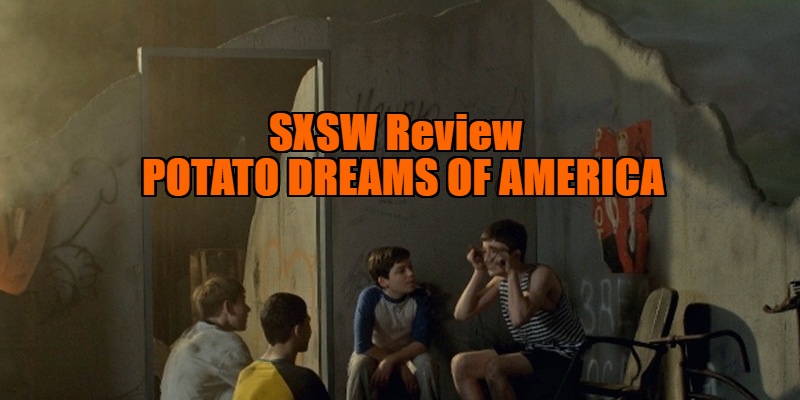
A gay boy growing up in the dying days of the USSR has his life upended
when his mail-order bride mother moves the two of them to America.
Review by
Musanna Ahmed
Directed by: Wes Hurley
Starring: Hersh Powers, Tyler Bocock, Jonathan Bennett, Sera Barbieri, Marya Sea
Kaminski, Dan Lauria

At its core, Potato Dreams of America is like many other
coming-of-age movies you know. It centres on a kid growing up in a
dysfunctional household who struggles with finding his identity, both
strands of life then compounded by new circumstances that enter in
parallel to adolescence. But writer-director Wes Hurley’s unique
perspective and combination of influences are fresh, making his deeply
personal film feel like something altogether new.

The filmmaker brings his lived-in experiences to life in this comedically
dramatised rendition of his youth, full of ticklish details like his
awkward teenage counterpart (played as a boy by Hersh Powers and as
a high schooler by Tyler Bocock) zipped up in a black hoodie
renting a VHS of Gregg Araki’s The Living End from a
self-indulgent video clerk. But before he’s in America watching New Queer
classics, the young Vasili Naumenko (the director’s actual birth name),
nicknamed Potato, is raised in the traditional Soviet way of life in the
decaying years of the USSR.
Just like the Nazi beliefs gave Jojo Rabbit an imagination of Hitler, the
Russian Orthodox ideal manifests an invisible friend for Potato in the
form of a chill Jesus (Jonathan Bennett), who just kinda wants to
kick back and watch cable films. The sight of an athletic Van Damme serves
as a burgeoning of Potato’s homosexuality, as he subsequently freaks out
about what he’s experiencing. In the meantime, his mail-order bride mother
is invited to the States by a gentleman named John (Dan Lauria), an
Archie Bunker-type who presents his own set of challenges for the
Naumenkos.

With his whimsical humour, love for symmetry and attention to costuming
detail, it’s easy to credit Wes Anderson for Hurley’s formal choices. But
Anderson could have never told this story. It has a cultural specificity
in its picturesque rendition of the USSR and how it clashes with the
looser, spaciousness of the US without painting one as better than the
other. It’s a complicated story of migration that could only be related to
us by an actual migrant who grew up in the '90s. More so a queer migrant,
as it is full of distinctive moments of self-discovery.
The two women who occupy the role of Potato’s mother Lena,
Sera Barbieri and Marya Sea Kaminski, are the standouts as
far as acting goes, fully realising the complex role of a prison doctor
turned mail-order bride who navigates through two different family units,
within two different socio-political spheres, with a sheer optimism, only
wanting the best for her beloved son. The beautifully written role is a
lovely tribute from a son to his mother. Aiding the performances is the
commitment to period detail which includes a soft, colourful '90s palette,
throwing us back to a time when filmmakers weren’t so obsessed with being
dark and gritty.

Potato Dreams of America is something of a cinematic
kaleidoscope. In addition to the intertextual engagement with movies and
an Anderson-esque visual style, Hurley features sequences dedicated to pop
musicals and the silent film era. For somebody who was so influenced by
films growing up, it felt inevitable that he was going to turn his life
into a movie.

Potato Dreams of America plays
online at SXSW from March 16th to 21st.

